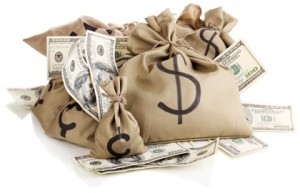
Looking to borrow money with a low credit score in the midst of a financial emergency can be troubling. If you’re out of options and wondering, “How can I get a loan with poor credit?” there are possibilities for consumers with limited borrowing options to get a loan. If you suddenly need money for a medical bill or to repair a car for work or an unexpected tax bill, even with a weak or low credit score, don’t give up on applying for a loan. Getting a loan with poor credit is still, by any other name, a personal loan.
Personal Loans
Personal loans help people put money in their pockets when they need it the most. They are a type of installment loan, meaning that the loan is structured to be paid back with interest and fees in installments over a period of time. Depending on the amount borrowed, the life of the loan can range from months to years. A personal loan can either be secured or unsecured. The difference being that collateral is used in a secured loan, such as a car title or other property, to back or ‘secure’ the loan. Unsecured loans do not require any type of collateral.
Though getting an unsecured loan with poor credit can be difficult, it can be done. Lending institutions treat personal loans to people with bad credit as they would any type of loan. If the loan is approved, you are expected to pay back the money borrowed in fixed installments, whether weekly or monthly. In such scenarios, understand your choices are limited and the terms can be rigid. Once approved, in most instances, the loan will have higher interest rates and likely be subject to more fees than such a loan with good credit.
If you have some form of collateral you can use it to apply for a secured loan. The interest rates and other fees may be lower than that of an unsecured personal loan. In secured loans, lenders will approve a certain amount of money to borrow based on the value or, a portion of, the collateral. Generally, the collateral can be anything with a legal title in your name—a car, truck, boat, motorcycle, or housing. Before signing off on a secured loan, be certain that you can meet the payments on time under any circumstance. If you fail to regularly make payments the lender can legally seize your collateral, and you could lose your car or condo.
Compare Loan Terms & Amounts
Before selecting a lending institution, at the very least, compare loan terms to find the best deal. Review the terms of credit unions, online lenders or local loan centers that market in poor credit loans. When comparing, there are several things to look for and pay attention to. First, the annual percentage rate, i.e., the APR, is the total annual coast of the loan with interest and fees. With poor credit, it’s likely to be high, but you should still compare lender rates beforehand.
Next, be sure the terms of loan repayment are affordable and can fit your budget, but also keep in mind the longer the loan repayment period, the more interest and money you’ll be paying out on the loan. Loan origination fees are another consideration for borrowers. Are there processing fees, late payment fees or prepayment penalty fees? Be wary of too many fees.
The last thing to compare is the loan amounts. Don’t borrow more than you need. A lender may require a minimum or maximum amount that can be borrowed but don’t be forced to borrow more than you need or even settle on two lenders to get enough of what you need. Either scenario you will have to pay more money in interest and/or fees.
Find a Reputable Lender
Finally, in addition to comparing loan terms, consider the lender’s reputation. You can look up information about a lender through the Chamber of Commerce, the Better Business Bureau, or simply look at the Google review ratings and read through a number of the comments. It’s not a bad idea to read through those comments. If there are 4 or 5 stars with a hundred or more comments, you may not receive the most optimal terms but you may find a better experience dealing with an honest lender rather than a predatory one.

